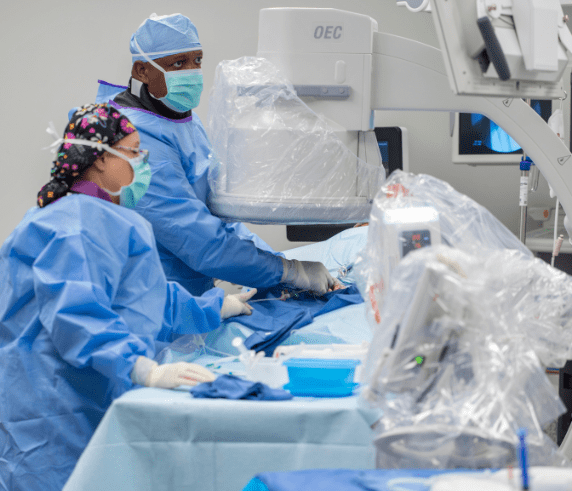- 1975 Nonconnah Boulevard Memphis, TN 38132
- 901.337.1625
At Metropolitan Cardiovascular Institute, our Memphis Limb Amputation Prevention experts are dedicated to saving limbs through early detection, advanced diagnostics, and personalized treatment plans. Many amputations are preventable when conditions like peripheral artery disease (PAD), diabetes, and vascular blockages are properly managed. Our team is committed to helping patients avoid unnecessary amputations and preserve mobility, independence, and quality of life.
Over 80% of non-traumatic amputations are related to poor circulation from PAD or diabetes.
Memphis and the Mid-South region have some of the highest amputation rates in the country.
Early detection of circulation issues can prevent severe complications and limb loss.
Advanced, minimally invasive treatments can help restore blood flow and promote healing.


Most preventable amputations are the result of untreated vascular conditions, such as:
Peripheral artery disease (PAD)
Diabetes-related foot ulcers
Severe infections
Chronic wounds or slow-healing sores
Poor circulation from narrowed or blocked arteries
Recognizing the warning signs is critical to preventing limb loss. Common symptoms include:
Leg or foot pain when walking (claudication)
Non-healing wounds on the feet or toes
Cold or numb toes and feet
Skin discoloration or hair loss on legs
Weak or absent pulses in the legs


Our Memphis-based vascular team uses cutting-edge technology to identify circulation problems and assess limb health. Diagnostic tests may include:
Ankle-Brachial Index (ABI): measures blood pressure in the legs compared to the arms
Doppler ultrasound: evaluates blood flow and detects narrowed arteries
Angiography: provides detailed images of arteries to locate blockages
Wound assessments: to evaluate depth, infection risk, and healing capacity
At Metropolitan Cardiovascular Institute, we offer a full range of treatment options designed to improve blood flow, promote healing, and reduce the risk of amputation:
Lifestyle changes: including smoking cessation, diet, and exercise
Medication management: to control blood pressure, cholesterol, and diabetes
Wound care and infection control: for diabetic ulcers and non-healing wounds
Minimally invasive procedures: such as angioplasty or stent placement to restore circulation
Surgical interventions: when necessary, to remove blockages or reconstruct blood flow pathways
Limb salvage programs: focused on long-term vascular health and wound management

If you're experiencing leg pain, non-healing wounds, or signs of poor circulation, early intervention could save your limb. Our Memphis Limb Amputation Prevention doctors are here to help you avoid surgery and live a healthier, more mobile life. Contact us at 901.337.1625 to schedule your cardiovascular checkup today.

HIPPA | Privacy Policy | Terms of Service